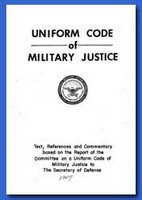
Censorship is the control of speech or other human expression. The freedoms against censorship granted to Americans comes primarily from the First Amendment of the Constitution which states:
Congress shall make no law respecting an establishment of religion, or prohibiting the free exercise thereof; or abridging the freedom of speech, or of the press; or the right of the people peaceably to assemble, and to petition the Government for a redress of grievances.
One could almost argue that asking AAFES to not sell pornography or CD's with explicit lyrics is censorship. However, that argument is logically invalid because the First Amendment states that we have the right to say what we want, but it doesn't guarantee us the ability to make a profit off of our speech. You can say what you want, but people don't have to be forced to listen to it or be forced to pay for it. That is why Wal-mart and Target don't sell pornography, because they choose not to.
Also, since AAFES is a government store, it could be argued that the government is censoring products. That just doesn't pass the common sense test. A store can't sell everything - even if it is a government store. It isn't going to sell books that teach us how to build bombs nor is it going to sell books that teach us how to break into government computer servers. AAFES "bans" those books from its product catalogs because they would threaten national security. A store can't sell everything, so by its very nature, even if it is run by the government, it must be selective in what it sells.
Another point. AAFES serves the military. The military doesn't fall under the First Amendment, those rights are actually taken away when you take your Oath of Enlistment or Commission. In fact, the military falls under a totally different judicial code called the Uniformed Code of Military Justice (UCMJ). In order to maintain good order and discipline, Congress and the President have powers within the Constitution to limit the speech of Service Members. Some laws in the UCMJ that limit free speech are Articles 88-90. They read as follows:
Article 88:
Any commissioned officer who uses contemptuous words against the President, the Vice President, Congress, the Secretary of Defense, the Secretary of a military department, the Secretary of Transportation, or the Governor or legislature of any State, Territory, Commonwealth, or possession in which he is on duty or present shall be punished as a court-martial may direct.
Article 89:
Any person subject to this chapter who behaves with disrespect toward his superior commissioned officer shall be punished as a court-martial may direct.
Article 90:
Any person subject to this chapter who—
(1) strikes his superior commissioned officer or draws or lifts up any weapon or offers any violence against him while he is in the execution of his office; or
(2) willfully disobeys a lawful command of his superior commissioned officer; shall be punished, if the offense is committed in time of war, by death or such other punishment as a court-martial may direct, and if the offense is committed at any other time, by such punishment, other than death, as a court-martial may direct.”
Not only to these military laws limit free speech, but they give superiors the ability to tell service members what to do. That is definitely not freedom; it is essential for discipline, however.
So back to AAFES. AAFES serves the military who falls under UCMJ. If AAFES sells products that contradict the spirit of the military, it shouldn't sell them. And if the military commanders or the civilian command authority decides a product undermines discipline in the military, they have every right, under the law, to ban that product. This in no way is censorship, because books are still allowed to be printed, movies are still allowed to be made, and CD's are still allowed to be produced. These companies just aren't going to make a profit on the military who wish to maintain their Honor and Decency.












